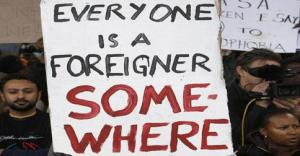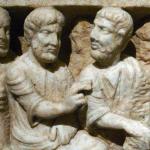
Surveys show that xenophobia, prejudice against people whom one sees as other, is more prevalent among religious people than among people with no religious affiliation. This is a problem today, and it was also for Jews and Christians during Bible times. The Bible has something to say about it, and so should preachers.
(Today I take another break from the current series of posts. I’ll do that mostly on Friday. Next post will be back to Mark’s Gospel.)
Psychology Today recently published an article on xenophobia in the religious and secular worlds. “Xenophobia, Religion, and Secularism” by Phil Zuckerman examines results of two surveys on attitudes toward people categorized as other. One survey asked Americans how they feel about census predictions that by 2043 peoples of color combined will be a majority of the population. The other asked Europeans questions about immigrants and different cultures. In summary, “In the surveys, tribalism and ethnocentrism were strongly correlated with being religious, while exhibiting a more universalistic, cosmopolitan embracing of all of humanity was strongly correlated with being secular.”
Specific results of the American survey show where xenophobia mostly resides:
- 52% of white Evangelicals said the shift to majority non-whites would be negative.
- 39% of mainline Protestants said the same.
- Of Catholics 32% expressed that sentiment.
- Only 23% of non-religious or secular Americans viewed the predicted changes negatively.
Other studies in past decades found similarly, Zuckerman says. “The more religious people are, the more likely they are to manifest an ‘us vs. them’ orientation.” And, “strongly religious Americans exhibit the highest levels of racism, while atheist[s] and agnostics exhibit the lowest levels.”
In fairness, the article lists positive outcomes of being religious:
For example, frequent church attenders are more likely to be charitable with their time and money than non-church attenders; they are more likely to report subjective feelings of happiness and well-being; and they are even more likely to live longer than the religious unaffiliated.
Benefits of being religious range from increased communal engagement and social capital to lower levels of depression.
Zuckerman makes some guesses why religion is “so consistently correlated with ethnocentrism, nationalism and xenophobia.” He suggests it might be related to “religious symbols and rituals that bind believers to one another, the cosmologies that construct ‘saved’ vs. ‘damned’ dichotomies, the rigorous patrolling of who a person can or can’t marry, and the obedience to authority that is so endemic of most religious traditions.” Some anti-religious bias peeks through these words, but he attempts to be fair. He says there is a “naturally evolved predisposition for in-group favoritism and out-group antipathy” that religion taps into.
Xenophobia and the Bible
You shall not molest or oppress an alien, for you were once aliens yourselves in the land of Egypt. (Exodus 22:20)
I read somewhere that the Church is the only organization that exists for the sake of its non-members. It’s not exactly true. You might want to drop the word “only.” But I think there’s a better way to make the statement true. You could add the word “all.” The Church really is the only organization in the world that exists for the sake of all its non-members. You have to wonder, though, why that purpose is not always evident.
Clearly religion does provide a kind of belonging and distinction from those who don’t belong. There is even in most religions a level of urgency to belonging. It’s not just a choice, it’s a mandate with far-reaching consequences. That mandate is in tension with other requirements, like universal love. The Bible reveals both the mandate and the tensions.
The priest Ezra served when the Jews were trying to re-establish their identity in Jerusalem after the return from the Babylonian Captivity. After studying the Law, he ordered Jewish men to send away any wives they had taken from the People of the Land. In the books of Ezra and Nehemiah, the Bible strongly enforces ethnic purity and isolation. But that’s not all the Bible has to say on this matter.
The Book of Ruth is a novelette (whether or not Ruth is a historical person) that counters what its author may have perceived as excessive ethnocentrism among Jews. In this story a foreigner is incorporated into the People of God and even becomes an ancestor to Israel’s most beloved ruler, King David. Another biblical book, Jonah, criticizes the Jewish attitude toward foreigners exemplified by the main character of the story. Jonah may have been a real prophet, though the story is what we might call a tall tale. The foreigners are the Ninevites, hated conquerors of the Northern Kingdom of Israel. But Jonah is reproved for not wanting God’s mercy extended to them.
The same dynamic plays out in the New Testament, and the solution is laid out clearly. The Book of Acts as well as Paul’s Letter to the Galatians approves Paul’s welcome given to the Gentiles over the opposition of some in the Church. Mark, the first Gospel written, shows by means of stories Jesus’ concern for foreigners. Jesus’ healing ministry benefits foreigners as well as Jews. Mark presents two stories of feeding multitudes. That duplication is puzzling until one realizes that one miracle is for a Jewish crowd and the other for Gentiles. (I have Ched Myers’ Binding the Strong Man to thank for this and many other insights.)
Religious people have a strong sense of their identity and their place in the scheme of things. Especially if they are church goers, they have reminders of this identity in a way and with a regularity that secular people are not likely to match. They have a more detailed and, frankly, more interesting story about their identity. All these factors, good in themselves, play into, as Zukerman says, our natural in-group favoritism and out-group antipathy, i.e., xenophobia.
Long ago, as recorded in both the Old and New Testaments, God’s people recognized the moral danger of xenophobia. Surveys comparing religious and secular people are showing that the same recognition does not sufficiently inform the preaching that people in the pews hear today.
















